Muhammad Ali is a name that symbolizes more than just sports leadership and victory. The boxing legend is often associated with courage, strength, and justice, something he has truly deserved throughout his life. Following iconic fights that defined his career, Ali’s unique fighting technique has solidified his top stance of worldwide boxing, forever changing the sport for future generations.
In this article, we will uncover the full story of the icon’s legacy, including his most legendary boxing achievements and influence on society.
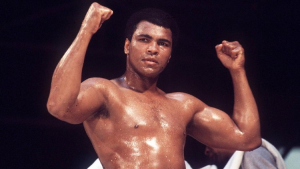
Introduction to Muhammad Ali’s Legacy
Muhammad Ali, born Cassius Marcellus Clay Jr., is one of the most iconic athletes in the history of sports and beyond. Not only did the boxer demonstrate amazing boxing skills throughout his professional career, but Ali also served as a social justice warrior and role model for younger generations. While his legacy continues to be inspirational for people from all over the world, it is essential to review how his journey began.
The Early Life of a Champion
Cassius Clay was born on January 17th, 1942, in Louisville, Kentucky, into a world heavily influenced by racial segregation and other unjust social issues. His connection with the boxing sport originated from an unpleasant story of his bike being stolen. Eventually, he joined a local boxing club, where his talent and drive were evident.
Through hard work and determination, the young boxer began his early life as a champion, winning numerous amateur titles. The 1960 Rome Olympics light heavyweight division win only sealed his fate, helping him show off his potential to the public eye.
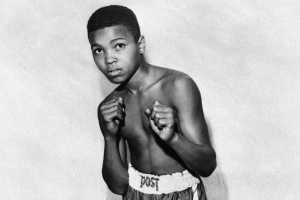
Source: https://nymag.com/intelligencer/2016/06/how-muhammad-ali-became-a-boxer.html
The Rise of Cassius Clay to Muhammad Ali
Following the Olympic victory, the young boxer only gained more confidence to pursue his passion. Soon enough, his talents were captured by various media outlets and fans from all over the world. From the very start, his natural predisposition to the sport combined perfectly with his charisma. At the same time, it was his victory over Sonny Liston in 1964, who was heavily favored at the time, that became the foundation for his groundbreaking success.
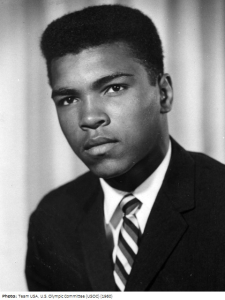
Source: https://www.olympedia.org/athletes/8643
Not long after the legendary victory, Cassius Clay announced his conversion to Islam and officially changed his name to Muhammad Ali. In that way, the boxer made a symbolic change that year, signaling a new chapter in both his personal and professional life. He was then officially committed to the Nation of Islam and to the values it suggested. Ali called himself by his “slave name” and rejected any trace of racial oppression at the same time. A big move for the society of the time, the transition had set the standard for Ali’s future role as a global icon of resistance and change.
Iconic Fights That Defined Ali’s Career
While a huge part of Muhammad Ali’s professional life included various social movements and influences outside of the ring, it was his boxing skills that made him famous. An amazing combination of talent and technique led the icon to victory every time in the most jaw-dropping events of boxing history.
The Fight of the Century: Ali vs. Frazier
At the time of the legendary fight, the world had two undefeated boxing champions, namely Muhammad Ali and Joe Frazier. Ever since the dual had been announced in 1971, millions of people were anticipating what was later referred to as “The Fight of the Century.”
Despite Ali’s resilience throughout the match, he was knocked down in the 15th round by Frazier’s devastating left hook. While many fans were shocked to see Ali lose, the fight became one of the most iconic spectacles in the history of boxing. It showed off both boxers’ unique skills and set the stage for future iconic encounters between the two champions.
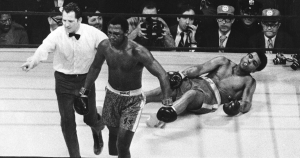
Rumble in the Jungle: The Battle Against Foreman
Only three years after “The Fight of the Century,” Muhammad Ali was once again faced with another reigning heavyweight champion, George Foreman.
The fight was held in Kinshasa of Zaire in 1974 and was considered the “Rumble in the Jungle” by fans and the media. Although Foreman was known for his power and relentless striking, the boxer could not escape Ali’s rope-a-dope strategy. The strategy involved leaning against the ropes and allowing his opponent to throw heavy punches, thereby exhausting himself. As a result, by the eighth round, Ali was able to knock an exhausted Foreman out, winning the match.
In that way, Muhammad Ali took over the heavyweight title reign and became a world champion once again. Critics point out the cultural significance of the win and the role of Ali in celebrating triumph altogether over adversity.
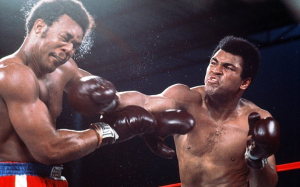
Source: https://www.thefightcity.com/ali-vs-foreman/
Thrilla in Manila: The Final Bout With Frazier
Muhammad Ali and Joe Frazier met once again for the third and final time in their legendary fight known as “Thrilla in Manila”, a fierce battle held in 1975 in the Philippines. Some argue that the battle became one of the most challenging parts of Ali’s career, considering the intense heat and humidity of the surroundings. The actual fighting was just as intense, featuring Frazier’s powerful blows and Ali’s skillful counterpunches.
Both champions had something to prove and were willing to go the long road to get ahead. Still, by the end of the 14th round, Frazier was unable to continue the fight. While Ali himself was close to giving up, he held on for longer, emerging victorious in the end. Once again, he solidified his role as the number one boxer and was ready for any competition.
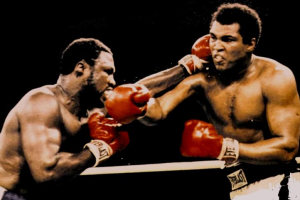
Ali’s Unique Boxing Style and Techniques
Muhammad Ali changed the game for all generations of boxers with his unique style and techniques. The legend’s style reflected the ability to “float like a butterfly, sting like a bee.” He showed quick yet light footwork and beat opponents with extremely fast jabs. It was nothing like what everyone was used to in the boxing world. A boxer’s success was no longer defined purely by their strength and power but rather by their intelligence in the ring. Ali was famously recognized for his agility and skillful outmaneuvering of his opponents.
One of his legendary moves, known as the “Ali Shuffle,” included quick movement of the feet to distract and confuse his opponents. The move had nothing to do with his physical strength, yet it had the power to overthrow some of the most powerful boxers of his time. It was evident that whichever signature moves his opponents would use on him, Ali’s tactical approach would have him leading either way. In the case of future generations, this skill would be an essential one to consider for other boxers, and sports sites such as the website in India 1xBet would review it in detail for modern champions.
Ultimately, the thoughtfullness and strategy behind every step were the keys to Ali’s victorious strategy, and coupled with his defensive ability, became unbeatable by all.
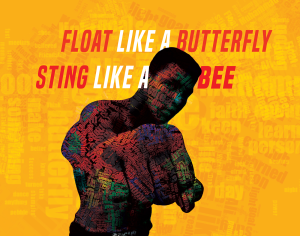
Source: https://www.behance.net/gallery/62142717/-Float-Like-a-Butterfly-Sting-Like-a-Bee-Ali
Beyond the Boxing Ring: Ali’s Influence on Society
From the very beginning, Muhammad Ali was more than just a talented boxer. By actively using his platform to speak up about important social issues, he became a symbol of activism in the world of professional sports and beyond. Whether it was an international conflict or a humanitarian cause, Muhammad Ali made an effort to be as involved as possible.
Standing Up for His Beliefs: The Vietnam War Stance
Ali was part of the no-war movement during the Vietnam War. As a protest to the concept of war overall, the boxer refused to be drafted into the U.S. military. It was both his personal opposition to the war and religious beliefs that prevented him from participating in any way.
Of course, his refusal resulted in severe consequences, including the stripping of his boxing titles and a ban from the sport that lasted several years. Despite the ban costing him several years of his prime boxing time, the legend did not hesitate to stand by his convictions in the anti-war movement.
Ali’s Role in the Civil Rights Movement
The boxing icon was also a vocal advocate for the Civil Rights movement in the 1960s. His close association with the Nation of Islam and friendship with its leaders cemented his role as a prominent civil rights activist. Over time, Ali became a symbol of Black pride and empowerment. There was nothing that could stop him from protesting against the existing racial prejudices, and he was determined to fight for equality throughout his career.
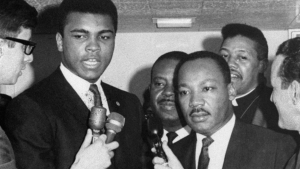
Source: https://www.biography.com/activists/martin-luther-king-jr-muhammad-ali-friendship
By remaining victorious throughout multiple boxing seasons, his success showed how African Americans can excel even in white-dominated spaces. In the end, he inspired thousands of aspiring athletes to pursue their dreams despite any existing barriers.
Charitable Efforts and Humanitarian Contributions
Later in his life, Muhammad Ali became even more involved in various humanitarian causes. As professional boxing started to lose its value in the legend’s livelihood, Ali focused more on charitable events and ways to help others. As a United Nations Messenger of Peace, he actively voiced his concerns regarding worldwide poverty, hunger, and civil rights. After traveling the world on a humanitarian mission, Ali became even more invested in the cause.
Furthermore, after being diagnosed with Parkinson’s disease in 1984, the boxing legend vocalized the importance of research on the condition and provided maximum support for the cause. His founded Muhammed Ali Parkinson Center is one of the many initiatives that reflected his values and helped to save thousands of lives. Through many years of devoted humanitarian work, Ali demonstrated his genuine intentions of fighting for a better world.
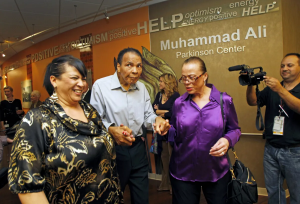
Source: https://www.thereporteronline.com/2016/06/06/ali-transformed-parkinsons-awareness-inspired-patients/
Muhammad Ali’s Influence on Future Generations
A comprehensive review of Muhammad Ali’s career and boxing journey demonstrates his evident influence on many generations of athletes and fans beyond the sport. In the boxing world, the legend has inspired thousands of athletes to pursue their dreams while staying true to themselves. Ali was able to stay victorious in the ring without jeopardizing personal beliefs, an essential factor that motivated future champions across various sports.
His followers, fighters who have been recognized globally for their power and activism, include legendary boxers such as Mike Tyson, Floyd Mayweather, and Anthony Joshua.
Even those who are not directly involved in the sport can learn something from the fighter’s story. Nearly a decade after Muhammad Ali’s passing, his legacy lives on in numerous communities worldwide.
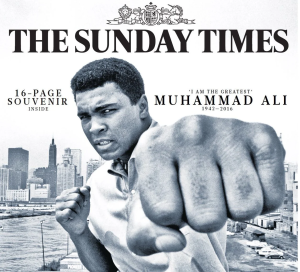
The Continued Legacy of Muhammad Ali in 2024
Undeniably, the legend will never be forgotten, as his legacy remains as relevant as ever in 2024. While his technique has been reviewed and analysed in detail by various sources, many of today’s top fighters are still intrigued by Ali’s execution of the fighting style. Most importantly, his political and social activism still resonates with the modern generational battle for equality, and his past efforts serve as a model for effective fighting against racial injustices.
Muhammad Ali’s timeless devotion to his principles and core values will always be significant for the evolution of society. As the world continues to struggle with issues of social injustice, Ali’s impact continues to inspire people to keep fighting.
Conclusion
The boxing icon’s life shows a journey of triumph and defeat, hope and faith, protests and activism. While Ali’s boxing style is cited as one of the greatest, there is no quantity of titles that can outnumber the number of people inspired by the personality and character of the fighter. Considering his simultaneous career success and incredible ability to keep fighting for human rights, the legend can be considered one of the most influential figures of the past two centuries.
Today, Muhammad Ali’s story is just as relevant, a reminder to keep fighting for our beliefs under any circumstances.
